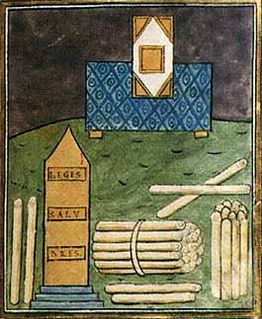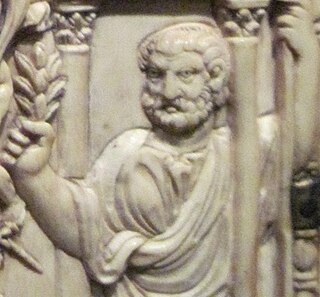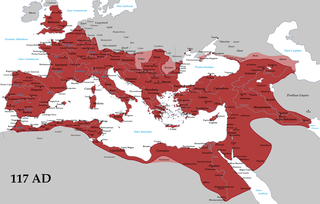Career
A native of Augusta Treverorum, Florentinus was possibly a Notarius around 379/380 AD. He was the Comes sacrarum largitionum in the west from 385 to 386 and the Quaestor sacri palatii in 395. After this he was given the post of Praefectus urbi of Rome, serving from 395 to the end of 397 AD before he was replaced by Lampadius. [1] During his time as Urban Prefect, Florentinus received numerous missives from the emperor Honorius concerning the duties, restrictions and rewards for the decurions. [2] He was also reprimanded by the emperor for issuing post warrants without imperial authorisation. [3] Soon after his term as Urban Prefect had ended he entered into retirement, living in Gaul.

A notarius is a public secretary who is appointed by competent authority to draw up official or authentic documents. In the Roman Catholic Church there have been apostolic notaries and even episcopal notaries. Documents drawn up by notarii are issued chiefly from the official administrative offices, the chanceries; secondly, from tribunals; lastly, others are drawn up at the request of individuals to authenticate their contracts or other acts.

The comes sacrarum largitionum was one of the senior fiscal officials of the late Roman Empire and the early Byzantine Empire.

The quaestor sacri palatii, in English: Quaestor of the Sacred Palace, was the senior legal authority in the late Roman Empire and early Byzantium, responsible for drafting laws. In the later Byzantine Empire, the office of the quaestor was altered and it became a senior judicial official for the imperial capital, Constantinople. The post survived until the 14th century, albeit only as an honorary title.
During his time in office, he received regular correspondence from Quintus Aurelius Symmachus, while Claudian dedicated to him the second book of De raptu Proserpinae. Florentinus had at least one son, called Minervius.

Quintus Aurelius Symmachus was a Roman statesman, orator, and man of letters. He held the offices of governor of proconsular Africa in 373, urban prefect of Rome in 384 and 385, and consul in 391. Symmachus sought to preserve the traditional religions of Rome at a time when the aristocracy was converting to Christianity, and led an unsuccessful delegation of protest against Gratian, when he ordered the Altar of Victory removed from the curia, the principal meeting place of the Roman Senate in the Forum Romanum. Two years later he made a famous appeal to Gratian's successor, Valentinian II, in a dispatch that was rebutted by Ambrose, the bishop of Milan. Symmachus's career was temporarily derailed when he supported the short-lived usurper Magnus Maximus, but he was rehabilitated and three years later appointed consul. Much of his writing has survived: nine books of letters; a collection of Relationes or official dispatches; and fragments of various orations.
Claudius Claudianus, usually known in English as Claudian, was a Latin poet associated with the court of the emperor Honorius at Mediolanum (Milan), and particularly with the general Stilicho. His work, written almost entirely in hexameters or elegiac couplets, falls into three main categories: poems for Honorius, poems for Stilicho, and mythological epic.
This page is based on this
Wikipedia article Text is available under the
CC BY-SA 4.0 license; additional terms may apply.
Images, videos and audio are available under their respective licenses.

Marcus Aurelius Marius was emperor of the Gallic Empire in 269 following the assassination of Postumus.
Gaius Caeionius Rufius Volusianus was a Roman senator who had a lengthy political career and who was appointed consul at least twice, the known dates being AD 311 and 314.
Lucius Caesonius Ovinius Manlius Rufinianus Bassus was a Roman military officer and senator who was appointed suffect consul twice, in around AD 260 and 284.
(Lucius) Valerius Maximus Basilius was a Roman senator who held high office during the reign of the Roman emperor Constantine I.
(Lucius) Valerius Maximus (Basilius) was a Roman senator who was appointed consul in AD 327.
Virius Lupus was a consul of the Roman Empire in 278.
Flavius Clearchus was a Roman politician who was consul of the Roman Empire in 384 AD.
Aristaenetus was a Roman politician who was appointed consul in AD 404 alongside the western emperor Honorius.
Flavius Claudius Antonius was a Roman politician under the reigns of Valentinian I, Gratian and Theodosius I. He was appointed consul in AD 382 alongside Flavius Afranius Syagrius.
Flavius Euodius was a Roman politician and military officer, who was appointed consul in AD 386 alongside Honorius, the infant son of the emperor Theodosius I.
Gaius Junius Donatus was a Roman politician, who was appointed consul twice, the second time in AD 260, during the Crisis of the Third Century.
Publius Cornelius Saecularis was a Roman politician who was appointed consul twice, first in around AD 240 and later in AD 260, during the Crisis of the Third Century.
Gaius Junius Tiberianus was a Roman soldier and senator who was appointed consul twice, first around AD 265, and then in AD 291.
Flavius Eusebius was a Roman military officer and politician, and is usually identified as the posthumous father-in-law of the Roman emperor Constantius II.
Flavius Hypatius was a Roman Senator, who was the brother-in-law of the Roman emperor Constantius II.
Titus Claudius Aurelius Aristobulus was a Roman soldier and politician who served as consul in 285 CE. He served two emperors, Carinus and Diocletian.
Ulpius Limenius was a Roman politician who was appointed consul in AD 349.
Gaius Annius Anullinus was a Roman senator who was appointed consul in AD 295.
Afranius Hannibalianus was the consul of 292 CE, a praetorian prefect, a senator and a military officer and commander.
Pomponius Januarianus was a Roman senator who was appointed consul in AD 288.






